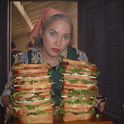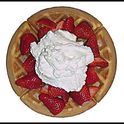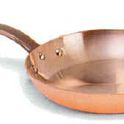Why would a recipe specify Dijon mustard?
Is there some kind of chemistry that is specific to Dijon mustard, or is it just the taste? What would be the best substitute for Dijon? We have many mustards, both commercial and home made, but the resident mustard maven does not like Dijon!
28 Comments
pierinoJuly 9, 2012
More on Dijon. The mustard is named after the city of Dijon, the capital of Burgandy. But it's not an AOC product. One would think that domestic labels would have to be called "dijonaisse" or something like that. But no. Grey Poupon is manufactured in the US (New Jersey, I think) and Maille is made in Canada. I'm perfectly content to buy the good stuff from the "cheese eating surrender monkeys" on the other side of the Atlantic.
Likewise there really is no such thing as California "champagne". Champagne is a specific region of France.
Likewise there really is no such thing as California "champagne". Champagne is a specific region of France.
micheleinmarylandJuly 9, 2012
There actually is a chemistry side of dijon (or any mustard) when it comes to vinaigrettes -- mustard acts as an emulsifier and keeps the oil and acid from separating out. So in the case of a vinaigrette, you can use a different type of mustard than dijon, or you can use another type of emulsifier, which of course will greatly alter the taste: tomato paste, garlic, egg yolk, etc.
BoulderGalinTokyoJuly 9, 2012
Thank you ChefOno-- very interesting! I wonder if squeeze bottles where less mustard is exposed to air are also under the 6 month rule, seems to have a longer expiration date.
ChefOnoJuly 10, 2012
Out of curiosity, at the supermarket today I checked a dozen or more Best By dates on glass jars and plastic bottles over several different brands and could find no correlation between bottle type and dates. My guess is the plastic bottles are more popular therefore sell quicker and are thus fresher. I have every reason to believe CI is correct that it's the pH alone that determines how much heat a formula has and thus how long it's likely to last on the shelf.
chefsusieJuly 6, 2012
One interesting article I read (cooks illustrated?) mentioned that mustard ages rather rapidly on the store shelf. Its flavor profile is best when its newer. It ages poorly. So when you buy. Look for a date lot that is newest. It loses its pugency before you even open it.
ChefOnoJuly 6, 2012
Yes, mustard is even more sensitive than dried herbs and spices. Best before 6 months, 1 year tops. Unless you like bland mustard…
ChefOnoJuly 9, 2012
From Cook's Illustrated:
When mustard seeds are ground, an enzyme called myrosinase is released. The myrosinase activates the mustard’s dormant heat-producing chemicals (called glucosinolates), but the addition of acid retards this reaction. So less acid produces a mustard with more heat-producing chemicals. These heat-producing chemicals, however, are volatile and will dissipate over time. For this reason, we recommend checking “use by” dates, buying fresher mustards when possible, and never storing Dijon for more than six months.
When mustard seeds are ground, an enzyme called myrosinase is released. The myrosinase activates the mustard’s dormant heat-producing chemicals (called glucosinolates), but the addition of acid retards this reaction. So less acid produces a mustard with more heat-producing chemicals. These heat-producing chemicals, however, are volatile and will dissipate over time. For this reason, we recommend checking “use by” dates, buying fresher mustards when possible, and never storing Dijon for more than six months.
BoulderGalinTokyoJuly 2, 2012
I have made this mustard from epicurious. After many dirty dishes and hours of prep, it did turn out wonderful--you could customize it. It was a very large batch, but it freezes well in an ice cube tray, so I have that homemade flavor whenever I want.
http://www.epicurious.com...
http://www.epicurious.com...
sexyLAMBCHOPxJuly 6, 2012
bet that would be great on soft baked pretzels...
mainecook61July 1, 2012
Raye's. Made in Maine. Buy American.
http://www.rayesmustard.com/
http://www.rayesmustard.com/
susan G.July 1, 2012
Thanks for all the insights. We are another family with mustards crowding out the food in the fridge, cupboards and pantry, mostly opened, used for a while and then abandoned. And when we were in business we sold many, including Raye's and Marne's Dutch Grained Mustard.
What I hear makes me feel that I have license to sub within wide bounds, and leave the yellow for the ballpark menu, as he already does.
What I hear makes me feel that I have license to sub within wide bounds, and leave the yellow for the ballpark menu, as he already does.
Bill F.July 1, 2012
Because dijon mustard is an amazing taste. And it's very hard to sub it.
ATG117July 1, 2012
I'm in the Maille camp. I think it exceeds Grey Poupon by miles. And I would also second the suggestion to try the grainier Maille variety, though the smooth stuff is my drug of choice.
sheredelJuly 1, 2012
very good question indeed! so will you be creating your own???
mainecook61July 1, 2012
Mmm, try Ray's Mustard, stone ground way down east in Eastport, Maine. There are all sorts of varieties to try. Zingerman's sells a few of them, as does Whole Foods. Ray's has a web site.
threefresheggsJuly 1, 2012
Oh, and to the resident mustard maven – it may be worth trying whole grain dijon – it seems to me that its flavor profile is different than creamy dijon. Also, if you haven't tried Maille, it is the best easily accessible French-style mustard – puts the standard American dijon to shame.
Dea H.July 1, 2012
I agree whole-heartedly. Maille is excellent, but Trader Joe's has an excellent whole-grain Dijon, and their creamy Dijon is a lot more piquant than Grey Poupon. I also like to mix mustards. When I make a tomato tart, I mix whole grain Dijon with a local cherry mustard to brush on the tart shell after it has been blind-baked. Then I fill it with a simple custard of goat cheese, and egg, and some fresh herbs. Top with a confit of tomatoes, and it makes an excellent lunch or appetizer.
threefresheggsJuly 1, 2012
Dijon is by definition a preparation of mustard with white wine, is my understanding. I don't much care for dijon on a sandwich, but it is the 'right' thing for salad dressing (the "pebbly kind", in my opinion). Gulden's spicy brown (hello sandwich!) is prepared exclusively with vinegar. Gulden's being spicy, and dijon not-so-much, maybe the wine mellows the heat? I think even the yellow stuff has it's place (I do not like cheetos, but yellow mustard on ballpark pretzels? Now we are talking my language of junk-food). My husband claims to have fallen in love with me because I had so many different types of mustard in my fridge. And I took that as high praise.
pierinoJuly 1, 2012
Indeed yellow mustard is also essential to the Chicago style hot dog, along with bright green relish and sport peppers. Ketchup is forbidden.
sexyLAMBCHOPxJuly 6, 2012
Yellow mustard on a NY hot dog (with ketchup) is my favorite! I agree with you 100% TFE, thats why I hae so many mustards. Variety is the spice of life!
ChefOnoJuly 1, 2012
Pierino is right on the money as usual. It's all about personal taste. I'm in neither the Dijon nor the French's camp myself. Guldens is a great alternative for both, center ground so to speak. Or Inglehoffer stone ground when you want some texture.
pierinoJuly 1, 2012
Yes, it is the taste. And digjon is on the spicier side but you can amp it up even higher if you want. But I wouldn't subsitute something like French's yellow mustard. There is a spectrum of flavor so you have to find the one that suits you, maybe one of those pebbly seed ones.
sexyLAMBCHOPxJuly 2, 2012
I love French's mustard on a simple sammie. I must hae some 8 ( counted) mustards lingering in the cupboard) and they each have their place!
Showing 28 out of 28 Comments
Recommended by Food52
Popular on Food52
Continue After Advertisement










